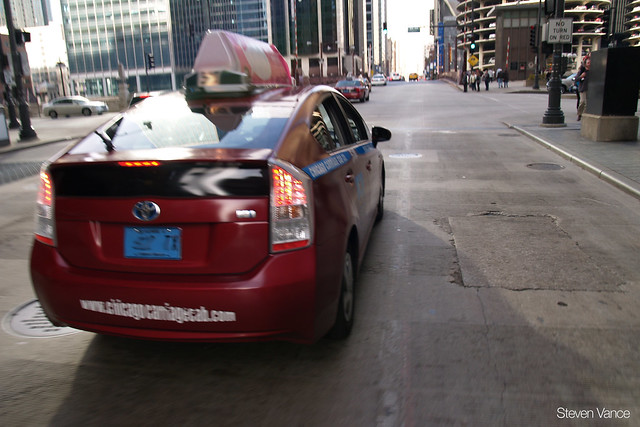[flickr]photo:8270774854[/flickr]
Bicycle signals on Dearborn Street at Madison Street were turned on as of Wednesday. Photo by Kevin Zolkiewicz.
Meeting minutes for the September 2012 can be downloaded (.pdf); read our recap of it.
Streets for Cycling Plan 2020
Download now (.pdf).
A few months late, the Streets for Cycling Plan 2020 will be released today, including a Bicycle Facilities Guide designed for all Chicagoans that shows the new facility types being installed on Chicago roadways and how to use them (no matter your transportation mode).
Bike sharing
The current focus is on finalizing the contract with Alta Bicycle Share. Chicago Bicycle Program coordinator Ben Gomberg said they would finish selecting the sites for bike sharing stations in January or February. Gomberg mentioned that Alderman Pawar is using menu funds to purchase 5 stations for the 47th Ward; Bill Higgins, a transportation planner in Pawar’s office, said that the “shortening” of the Chicago Transit Authority’s (CTA) 11-Lincoln bus route (eliminating it from a 3 mile stretch between Western/Lawrence and Fullerton Avenues) was a basis for buying the stations. Alderman Moreno is also using menu funds to purchase 2 stations for the 1st Ward. DePaul University, Gomberg said, was interested in purchasing 3 stations.
No mention was made of the investigation by the Chicago Inspector General. Jane Healy, an activist from Blue Island, Illinois, and a board member for Active Transportation Alliance, asked if there was a timeline. Luann Hamilton, Deputy Commissioner of Project Development at the Chicago Department of Transportation (CDOT), replied that there wasn’t one.
The cost of purchasing an additional station (there will be 300 purchased by the City in the first year an additional 100 kiosks in the following year) is $56,000, which includes 19 docks and 15 bicycles; there’s a discount if you buy more than one. CDOT will not be charging an operating fee to those entities who purchase kiosks, a policy in place at the Washington, D.C.-centered Capital Bikeshare program.
CDOT is looking for an organization to sponsor the bike sharing program. Citibank paid $41 million for the naming rights in New York City: “Citibike”. Continue reading Highlights from December’s Mayor’s Bicycle Advisory Council meeting
